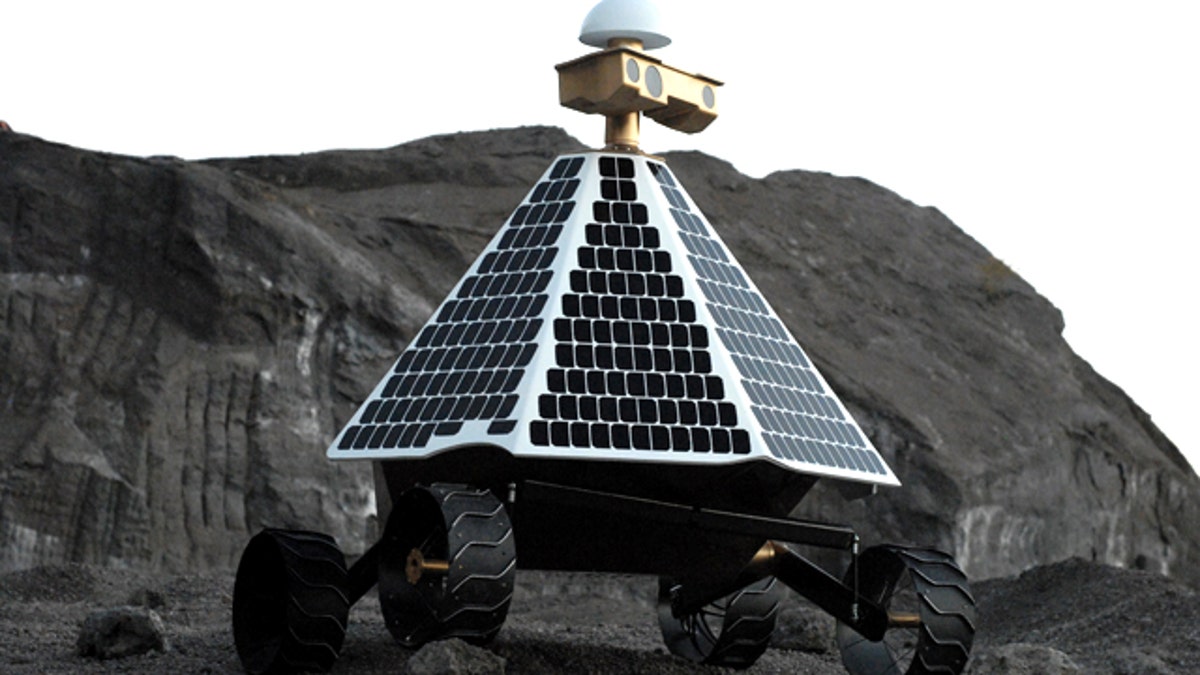
Astrobotic Technology's Red Rover, a lunar exploration vehicle that the company claims will be able to scout and drill for precious resources at the moon's poles. (Astrobotic Technology)
Moon, we just can’t quit you.
NASA has shifted its goals from returning to the moon to visiting an asteroid or even Mars, but not everyone has given up on going back. The space agency's attention deficit has sparked a race among private companies eager to return to Earth's satellite.
The latest competitor is Astrobotic Technology, a spinoff of the Robotics Institute at Carnegie Mellon University. Its goal: to mine the moon for water and fuel. And a deal with NASA plus a contract for rides on private rockets means the company may be the first to go back.
“We are in the first three months of a two-year contract,” David Gump, president of Astrobotic, told FoxNews.com. "We'll have a field-tested robot that will be able to go to the poles" on the moon to extract water, methane and more, he said.
Astrobotic isn't the only company that hopes to dig up the moon. Last week, FoxNews.com revealed the story of Moon Express, which sees greenbacks in all that lunar "green cheese." In all, 26 companies are in the race, many fueled by the Google Lunar X Prize, a $20 million contract to put men back on the moon.
But a contract with the California company SpaceX to hitch a ride to the moon on its Falcon 9 rockets sets Astrobotic apart, the company argues. On board the rocket, which is planned to launch in late 2014 or early 2015, will be Astrobotic’s own lunar lander, which will take the company’s mining robot to the moon’s surface.
SpaceX spokeswoman Kirstin Brost Grantham confirmed to FoxNews.com that the contract does in fact exist.
Even NASA has a stake in the company, having negotiated seven contracts with Astrobotic, the company claims: one to develop an excavator and others to give NASA information on how the company will carry out its mission at a low cost.
Potential targets include water, methane, and ammonia, hidden in pockets within the moon. Scientists are certain these elements exist beneath the lunar surface, but are unsure about the quantities and in what form they reside.
“The readings ... indicate there’s pretty substantial water at the poles, but we won’t know more until you go and take samples,” Gump told FoxNews.com. “So we’ll both confirm the readings taken from orbit and discover how the resource is spread out.”
While the company’s main focus is to extract these substances from the poles, Astrobotic hopes to find an even rarer element on the moon, one that could have a potentially huge impact on life on Earth the mysterious helium 3.
“There’s an element deposited by the solar wind called helium 3 that many people believe is the key element for fusion reactors,” Gump said.
Current nuclear reactors work through fission, which involves radioactive fuel and generates large quantities of heat. “If we can convert to a fusion fuel cycle, it’s carbon free and radiation free,” Gump said. “It could really improve things on Earth and be the basis for a very benign and cost-effective way to stabilize our civilization.”
Astrobotic's dreams reach beyond lunar excavation. The company has corporate sponsorships in return for delivering large payloads of roughly 240 pounds to the moon, including scientific instruments that need testing on the lunar surface. Only 15 percent of the company's revenues will come from the Google Lunar X Prize, Gump claims. Contracts are the real treasures.
Gump says that without its contracts, the company wouldn’t even be on the map.
“You’re not really a player unless you have some contract to get you to the moon. And we have that contract,” Gump said.








































